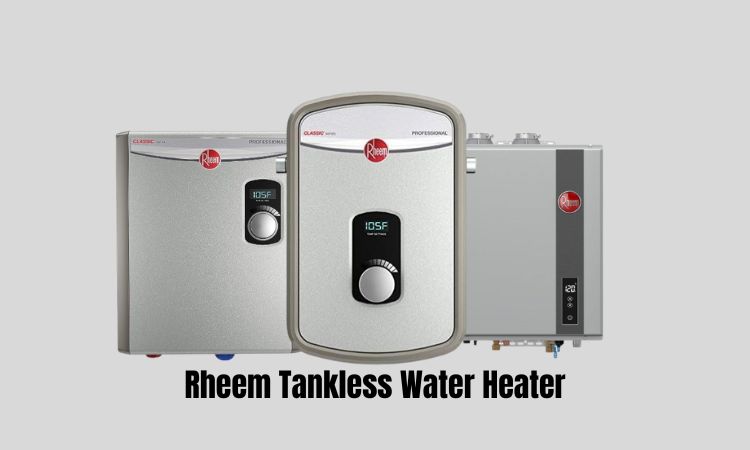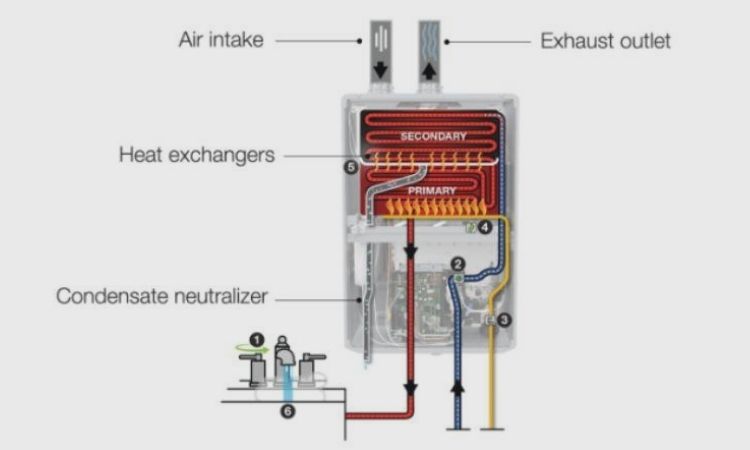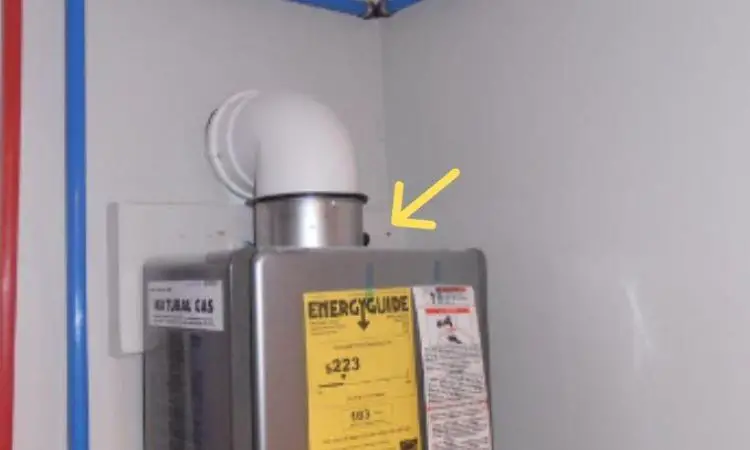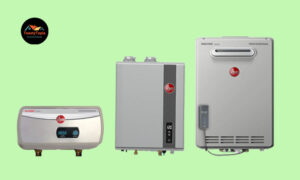At basics, tankless water heaters have fewer issues than the tank type. Yet the Rheem tankless water heater leaking from bottom is a frequent one that may have serious consequences, causing damage to the water heater as well.
Thus knowing the actual reasons and taking the right actions at the right time is a must. The most common reasons why your tankless water heater leaks include:
- High water pressure
- Malfunction of the pipes due to freezing water
- Hard water build-up
- Loose water pipe connection
- Or poor ventilation.
Inspect the water heater for any signs of cracks or damage. At times, adjusting the water pressure and flushing the water heater is enough to resolve the issue. If not, call up your plumber to get your water heater examined.
But before that, let’s dive into the detailed discussion on how to fix the issue by yourself.
Table of Contents

Rheem Tankless Water Heater Leaking From Bottom: Quick Overview
In this section, I’ll share my first-hand experience on how you can diagnose the obvious reasons and how to fix the common issues instantly that can cause your Rheem tankless water heater leaking:
| Probable Reasons | Recommended Fix |
| High water pressure | Adjust the water pressure |
| Frozen water control and bypass valve | Thaw the frozen pipe and inspect it for any signs if leak |
| Sediment buildup in the system | Descale and flush your water heater. |
| Loose connection | Tighten all the loose water connections and fittings |
| Poor venting system | Secure the venting as per the manufacturer instructions. |
What Causes A Rheem Tankless Water Heater To Leak From Bottom? [5 Easy Solutions]
Still, wondering why there is a water leak from the bottom of your Rheem tankless water heater? Not more as I have a detailed hide here for you, highlighting all the common reasons for this issue with their quick and effective solutions. Here you go!
1. High Water Pressure and Flow Rates
If your Rheem tankless water heater leaks at the base, high water pressure throughout the system is one of the root culprits to blame. Unlike other tankless water heaters, Rheem tankless water heater is designed to ensure optimal performance only if there are accurate water flow rates and water pressure.
In case, the pressure is too high, it may cause excessive pressure buildup to the pipes leaks, leading to leakage. At times, you may encounter severe water damage to your water heater plumbing system as well. Thus quick action is a must.
How To Fix:
First of all, you need to ensure the fact that the leak issue is caused due to high water pressure. For instance, take a pressure gauge and measure the water flow rate in the system.
If it is more than 80 PSI, be sure the culprit is here. For instance, head to the water shut-off valve and reduce the water flow rate at 60 PSI.
Then inspect the interior lining of your tankless system for any visible signs of a leak. For instance, head to a professional for better assistance.
2. Frozen Water Control & Bypass Valve
While dealing with the leakage issue in my Rheem tankless water heater, I discovered that uneven weather conditions are one of the big culprits for this problem.
Even leaking from the water connection due to freezing water is a common phenomenon that users often face. So in this case, when you are struggling with the leaky Rheem tankless water heater at the base, the best chances are the water control & bypass gets damaged like shown in the picture below:
During freezing temperatures, water generally tends to expand when it freezes, forcing pressure on pipes, resulting in leaks or cracks in the pipeline or joints. You may notice water bubbling at the sight.
If it goes continually, the pipe may burst out, leading to serious water damage. In worst cases, you may notice water flowing and you may run out of hot water in your tankless water heater.
How to Fix:
The problem while you dealing with leakage due to frozen pipes, consider calling a professional plumber or thawing the pipes yourself. For instance, your first step would be turning off the shut-off valve immediately.
Inspect the section of the plumbing from where the water is leaking out. To thaw the pipe, use a hair dryer or heat lamp to defrost the water pipes. Or, use a towel to dry the wet surfaces.
Now, if you notice the pipes have already burst out, let the plumber deal with the issue. You may need to install the new pipe as a replacement for the cracked or damaged one.
Tips To Prevent The Pipes From Freezing:
- It’s always a good idea to winterize your tankless water heater before coming chilly winter.
- Besides this, you can insulate the water pipes properly during freezing periods.
3. Rust or Sediment Causing Damage To The Heat Exchanger
Sediment or rust buildup in the heater inside due to bad water condition is one of the major reasons if the water is leaking from your gas tankless water heater at the base.
The factor is mainly related to the hard water or acidic water that is running through the plumbing system of your house.
Basically, hard water contains naturally occurring dissolved mineral sediments like calcium and magnesium that easily accumulate in the piping system. In that case, when it passes through your tankless system, it turns into hard particles and settles down there.
In the worst case, it impairs the overall function of the heat exchanger, causing it to overheat over time. When the sediment goes at a larger amount, it results in pinholes in the system leading to eventual leakage.
How To Fix:
Well! The only way to deal with this issue is descaling and flushing your tankless water heater. You can call a professional to help you do that or you can do it yourself. Flushing a Rheem tankless water heater seems to be quite straightforward as long as you follow our comprehensive guide.
After descaling the heater and still, there is leakage, the best chances are the heat exchanger gets cracks or damage that need replacement.
Tips: If you are living in a hard water area, installing a water softener or whole-house acid neutralizer would be the best suggestion for you.

The water softener will prove effective enough to minimize calcium, magnesium, and other minerals buildup in your piping system and tankless water heater. In case of acidic water, neutralizers will discourage pinholes and cracks from forming on pipes in the plumbing system.
4. Incorrect Or Loose Water Pipe Installation
Most of the time, if a water leak at the bottom of the Rheem tankless water heater, the loose connections from the water pipelines may be the source of this leakage. If any of the pipes or water valves connected to your water heater are loose, springing a leak is quite obvious.
How to Fix:
To correct the issues, turn off your water heater from the power line first. If it is a gas-equipped Rheem tankless water heater, you need to shut off the gas supply as well.
Now, inspect all the connections for your water heater for any loose fittings. If needed, remove the front panel for better investigation.
If you find one, you need to secure all the pipes and valves connected to your tankless water heater. Don’t miss to inspect the drain valve as well as the leakage issue may occur from there as well. Use a pipe wrench to tighten the pipes and fittings.
Check the condensate drain line for internal or external blockage. It should not have any unnecessary P traps. Go through your Rheem tankless water heater manual to get the detailed instructions.
5. Poor Venting System
If your Rheem tankless water heater leaks water from the bottom, a higher possibility is you haven’t installed the venting system of your water heater according to the manufacturer’s instructions.

Due to an improper venting system in a tankless water heater, it’s a common reason that it would lead to condensation inside the water heater itself. And ultimately you will get condensation leaking out from your water heater.
This mostly happens in a Rheem tankless water heater where proper venting is crucial in order to escape the combustion gas from the system.
How to Fix:
As a solution, you need to ensure the proper venting of your tankles system as per the specification of the manufacturers. If you are confused, we’ll recommend to head to a professional installer to inspect the venting system of your Rheem tankless water heater.
He’ll better suggest you install the tankless water heater correctly.
Essential Maintenance Tips To Reduce The Risk Of Water Leak
It may be unknown to you that a leaky water heater can easily be avoidable if you maintain the proper instructions. Here are all the essential tips to follow if you are wondering about how to reduce the most frequent water leaks in your Rheem tankless water heater:
1. Evaluate & Adjust All the Pipe Connection
It is a good idea to inspect the water heater internally at least on an annual basis for any signs of damage or failure. Any signs of damage, cracks, leakage or weakness should be addressed. Clean out the debris, tighten all the loose connections, or do repairs if there is any need. For instance, you may seek help from a professional.
2. Descale & Flush Your Water Heater
You should be regular to descale and flush your tankless water heater at least once or twice a year. It helps to prevent settling the sediment, calcium, sand, and minerals in the system that would lead to leakage issues. Also, this will help you to avoid the need for costly repairs due to severe damage from hard water buildup.
3. Install an Active Water Leak Detector
You can install a water leak detector in your Rheem tankless water heater to detect in the event that a leak ever occurred in the system. By this, you can take action as early as possible before it spirals out of control. You may even install an automated emergency shut off valve that will stop the water flow to the unit if there is any leak.
4. Adjust the Temperature Setting
Another effective way to minimize the risk of water heater leaks is adjusting the temperature. Higher temperature increases pressure in the system, leading to leaks and bursts. Thus set the temperature at the recommended level. It will even help you to save a few bucks on your monthly energy bill.
FAQs:
Is it normal for a Rheem tankless water heater to leak?
No, that’s obviously not! Leakage in the water heater always indicates a serious problem with your unit. It may lead to severe damage to the floor, walls, or even at times in the water heater as well. This quick inspection and repair is a must!
How long will a tankless water heater last that is leaking from the bottom?
The lifespan of the water heater will depend on the source of leakage. It may last twelve to fifteen years. leaking from a tankless water heater doesn’t mean it is at the end. Proper diagnosis and care can resolve the issue.
Can a leaking Rheem tankless water heater burst?
Yes, it can! If your Rheem tankless water heater leaks due to high-pressure build-up, it may cause a leak and burst. For instance, you need to reduce the pressure to the appropriate range through a pressure regulator.
In Closing
Just because when your Rheem tankless water leaking from bottom, damage to water pipelines or a blocked heat exchanger is the core factor to blame. Thus try to resolve the issue by flushing your water heater first. Then, look for the actual source of the leaking. The earlier you can detect the source, the less chance there will be severe damage to your water heater.
If all that seems hard for you, you will need a professional plumber to come in and inspect your water heater entirely. Hope you will get your water heater back to normal functioning.
Yet, if you face any more troubles while operating your heater, our comprehensive guide on common problems of the Rheem tankless water heater will be enough to prove well. Make sure you can check that out!

